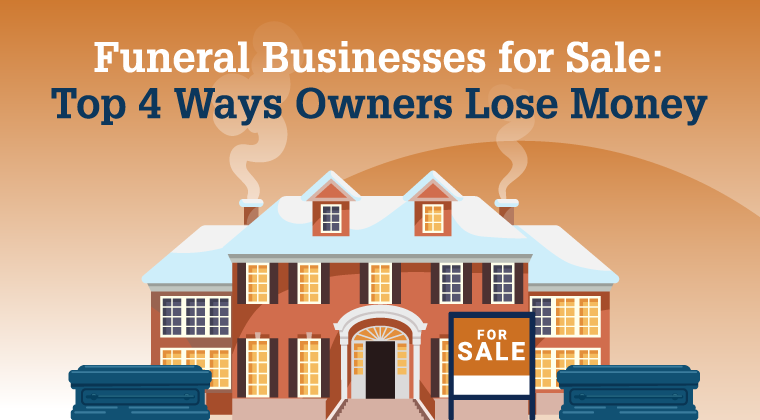For many, selling a funeral home feels like a victory lap — the culmination of decades of owning and operating a successful business. That said, an impending sale requires careful attention and planning. Failing to consider all the components of a successful sale can cause you to take an unfavorable deal.
To help you learn from the mistakes of others, here are the most common ways owners lose money in a sale.
1. Taxes
Selling a funeral business requires careful consideration of tax implications. First and foremost, you’ll want to consider the capital gains tax. Since funeral homes are typically owned for many years, they often see a significant increase in value from the time of the initial purchase.
In 2023, the capital gains tax rate was between 15%-20% for most individuals. So if you purchased a funeral business for $100,000 and sold it for $800,000, you could owe between $105,000 and $140,000 in capital gains taxes.
Additionally, since most funeral businesses include real estate, you’ll also want to consider the depreciation recapture tax. If you’ve been deducting a percentage of your facilities’ values from regular wear and tear, then the IRS will collect taxes on the eventual profitable sale of said facilities.
2. Under or Overestimating Your Funeral Home’s Value
You wouldn’t sell a house without first getting it appraised. In a similar way, you can’t sell your funeral home without obtaining a formal valuation. One of the biggest mistakes when selling funeral homes is failing to know the actual value of the business beforehand.
Underestimating the value of your funeral home can lead to the loss of hundreds of thousands of dollars. On the other hand, overestimating its value will likely prevent a sale altogether, even though offers may have been correct values for the business. This puts the seller in a position of holding onto the business longer than they should.
Obtaining a valuation will also let you know if you’re ready to sell. This is why a valuation should be conducted once per year. If your funeral home is valued lower than you’d anticipated, you might need to hold off on selling until you can improve and obtain a higher valuation.
3. Following Insanity
The definition of insanity is doing the same thing over and over again and expecting a different result, that holds true with how we operate funeral homes, but wanting a higher value.
When people want a higher value, there’s nothing wrong with that. What’s wrong is they don’t do anything about it. When you find that you have a certain expectation for retirement, the next step is to hire an outside consultant to come in, review your financials, how you operate your business, and create a strategic plan to get you to the value you’re looking for.
Most people do not follow this step and just expect that somehow their value will be more in the future, which is not a good plan and typically follows the definition of insanity. Don’t expect osmosis to create a higher value for your business, create a strategic plan, and take control of your future destiny.
4. Taking the DIY Method
Some funeral home owners attempt to sell their businesses on their own. Unfortunately, this method is not only likely to fail, but –– in the event that you succeed –– you’ll lose out on additional dollars.
While an accountant or lawyer can likely help with the process, only an industry expert understands the specifics of funeral home transactions –– including structure, ownership benefits after the transaction, tax strategies, confidentiality, when site visits are appropriate, when staff notifications are appropriate, and the list goes on!
An expert in the industry will already know these ins and outs and can get the most value out of your sale.
Why a Funeral Home Broker Is a MUST
From seeking out qualified buyers to negotiating a favorable deal, a funeral home broker plays an essential role in the sale of a death care business.
At Johnson Consulting Group, our team will ensure that you do not lose money on your sale. Since it can be guaranteed that Johnson Consulting will secure more money in a sale, we like to say that at a minimum that we pay for ourself!
